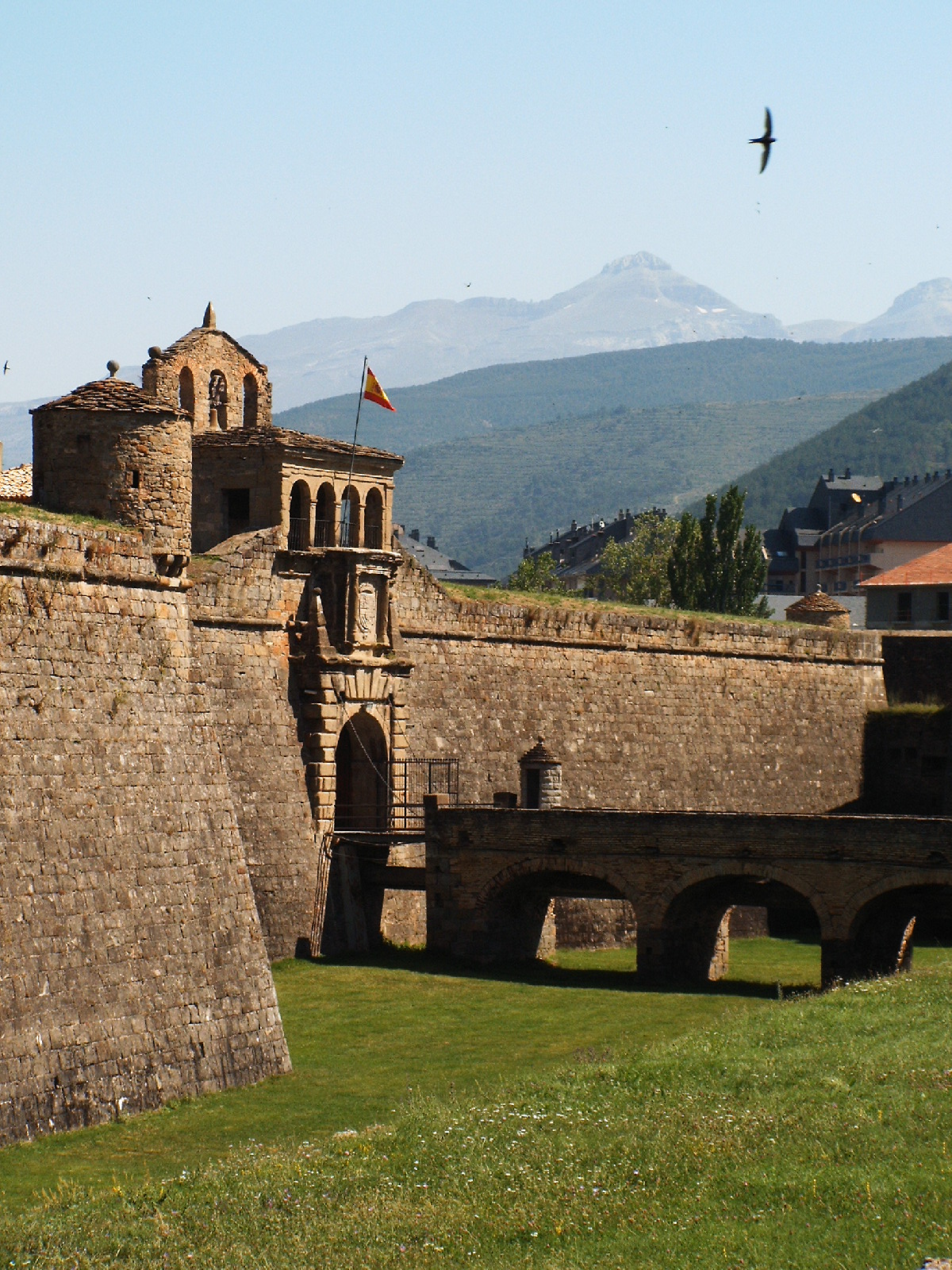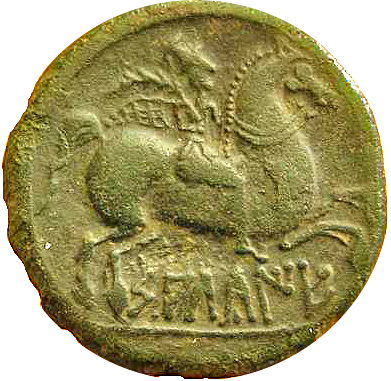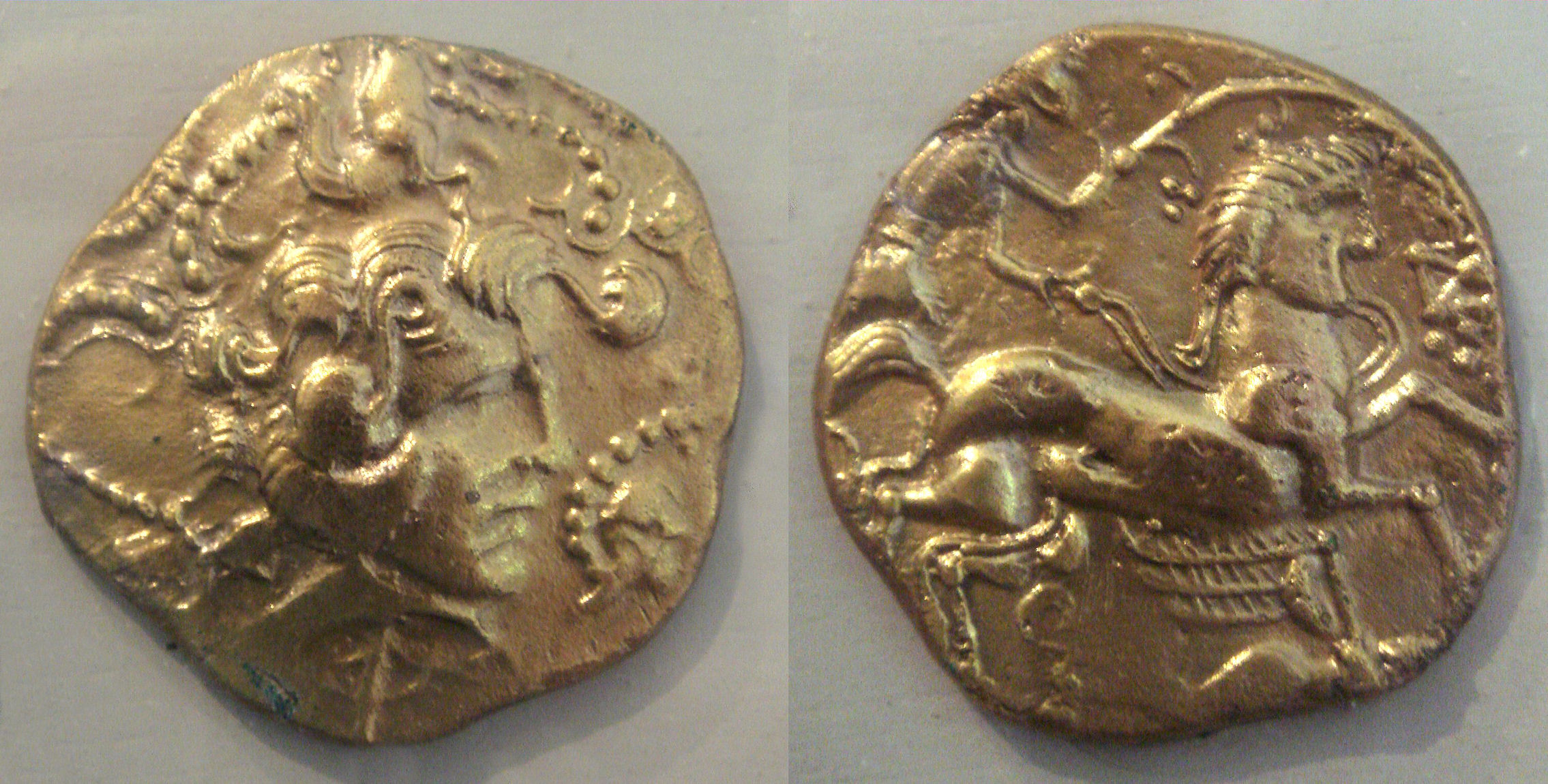|
Iacetani
The Iacetani or Jacetani (''iakketanoi'' in Greek, or la, iacetani) were a pre-Roman people who populated the area north of Aragon (Spain). They settled the Ebro valley, specifically in the area along the Pyrenees. Its capital was ''Iaca'' (now Jaca). According to Strabo, their land stretched from the Pyrenees to Lleida and Huesca. It is believed that they could be related to the Aquitanes. They were known to stamp coins. They also appear in the texts of Pliny the Elder and Ptolemy. Their affiliation with the Vascones is disputable, as they inhabited an area in the high Aragon river valley (today's northwestern corner of Aragon). Strabo mentions Iacetani in his Sertorius chronicles as people independent from the Vascones, although another Greek historian, Ptolemy identified them with the Vascones. According to some theories, they may have originated from the Aquitanians who crossed the Pyrenees and settled in the southern slopes of the mountains along with the Vascones (they coul ... [...More Info...] [...Related Items...] OR: [Wikipedia] [Google] [Baidu] |
Suessetani
The Suessetani were a pre-Roman people of the northeast Iberian Peninsula that dwelt mainly in the plains area of the Alba (Arba) river basin (a northern tributary of the Ebro river), in today's Cinco Villas, Aragon, Zaragoza Province (westernmost Aragon region) and Bardenas Reales area (southernmost Navarra region), west of the ''Gallicus'' river (today's Gállego river), east of the low course of the Aragon river and north of the Iberus (Ebro) river, in the valley plains of this same river. Their location, in relation to other tribes, was south of the Iacetani ( Aquitanian tribe), west of the Vescetani or Oscenses ( Iberian tribe) north of the Lusones and Pellendones ( Celtiberian tribes), also north of the Sedetani ( Iberian tribe), and southeast of the Vascones ( Aquitanian tribe or people). Corbio was the capital of the Suessetani and an important fortified city, yet unlocated (maybe between Sangüesa and Sos del Rey Católico). Ethnic and linguistic affiliation There is ... [...More Info...] [...Related Items...] OR: [Wikipedia] [Google] [Baidu] |
Pre-Roman Peoples Of The Iberian Peninsula
This is a list of the pre-Roman people of the Iberian Peninsula (the Roman Hispania, i. e., modern Portugal, Spain and Andorra). Some closely fit the concept of a people, ethnic group or tribe. Others are confederations or even unions of tribes. Pre-Indo-European speakers Aquitanians * Airenosini/ Arenosii *Iacetani *Vascones Iberians * Andosini - in the mountains of East Pyrenees southern slopes, in the high Segre river basin, area of modern Andorra. *Ausetani - in the Osona region (old County of Osona), in the middle Ter river basin. Ausa (today's Vic) was their main centre. *Bastetani/ Bastitani/Bastuli - The biggest iberian tribal confederation in area, they dwelt in a territory that included large areas of the mediterranean coast and the Sierra Nevada, in what are today parts of the modern provinces of Murcia, Albacete, Jaén, Almería, Granada and Málaga. Basti (today's Baza) was their main centre. ** Mastieni - in and around Mastia territory ( Cartagena). *B ... [...More Info...] [...Related Items...] OR: [Wikipedia] [Google] [Baidu] |
Jaca
Jaca (; in Aragonese: ''Chaca'' or ''Xaca'') is a city of northeastern Spain in the province of Huesca, located near the Pyrenees and the border with France. Jaca is an ancient fort on the Aragón River, situated at the crossing of two great early medieval routes, one from Toulousse to Santiago de Compostela and Pau to Zaragoza. Jaca was the city out of which the County and Kingdom of Aragon developed. It was the capital of Aragon until 1097 and also the capital of Jacetania. Villages Besides Jaca town, there are a number of outlying villages in Jaca's municipality, including the ski resort of Astún. History The origins of the city are obscure, but its name is apparently of Iacetani origin, mentioned by Strabo as one of the most celebrated of the numerous small tribes inhabiting the Ebro basin. Strabo adds that their territory lay on the site of the wars in the 1st century BC between Sertorius and Pompey. According to the atlas of the ancient Greek and Roman worlds Jaca was ... [...More Info...] [...Related Items...] OR: [Wikipedia] [Google] [Baidu] |
Aragon River
Aragon ( , ; Spanish and an, Aragón ; ca, Aragó ) is an autonomous community in Spain, coextensive with the medieval Kingdom of Aragon. In northeastern Spain, the Aragonese autonomous community comprises three provinces (from north to south): Huesca, Zaragoza, and Teruel. Its capital is Zaragoza. The current Statute of Autonomy declares Aragon a '' historic nationality'' of Spain. Covering an area of , the region's terrain ranges diversely from permanent glaciers to verdant valleys, rich pasture lands and orchards, through to the arid steppe plains of the central lowlands. Aragon is home to many rivers—most notably, the river Ebro, Spain's largest river in volume, which runs west–east across the entire region through the province of Zaragoza. It is also home to the highest mountains of the Pyrenees. , the population of Aragon was , with slightly over half of it living in its capital city, Zaragoza. In 2020, the economy of Aragon generated a GDP of million, which repr ... [...More Info...] [...Related Items...] OR: [Wikipedia] [Google] [Baidu] |
Aragon
Aragon ( , ; Spanish and an, Aragón ; ca, Aragó ) is an autonomous community in Spain, coextensive with the medieval Kingdom of Aragon. In northeastern Spain, the Aragonese autonomous community comprises three provinces (from north to south): Huesca, Zaragoza, and Teruel. Its capital is Zaragoza. The current Statute of Autonomy declares Aragon a '' historic nationality'' of Spain. Covering an area of , the region's terrain ranges diversely from permanent glaciers to verdant valleys, rich pasture lands and orchards, through to the arid steppe plains of the central lowlands. Aragon is home to many rivers—most notably, the river Ebro, Spain's largest river in volume, which runs west–east across the entire region through the province of Zaragoza. It is also home to the highest mountains of the Pyrenees. , the population of Aragon was , with slightly over half of it living in its capital city, Zaragoza. In 2020, the economy of Aragon generated a GDP of million, which re ... [...More Info...] [...Related Items...] OR: [Wikipedia] [Google] [Baidu] |
Aquitanians
The Aquitani were a tribe that lived in the region between the Pyrenees, the Atlantic ocean, and the Garonne, in present-day southwestern France in the 1st century BCE. The Romans dubbed this region ''Gallia Aquitania''. Classical authors such as Julius Caesar and Strabo clearly distinguish the Aquitani from the other peoples of Gaul, and note their similarity to others in the Iberian Peninsula. During the process of Romanization, the Aquitani gradually adopted Latin (Vulgar Latin) and the Roman civilization. Their old language, the Aquitanian language, was a precursor of the Basque language Trask, L. ''The History of Basque'' Routledge: 1997 and the substrate for the Gascon language (one of the Romance languages) spoken in Gascony. History At the time of the Roman conquest, Julius Caesar, who defeated them in his campaign in Gaul, describes them as making up a distinct part of Gaul: Despite apparent cultural and linguistic connections to (Vascones), the area of Aquitania ... [...More Info...] [...Related Items...] OR: [Wikipedia] [Google] [Baidu] |
Iberians
The Iberians ( la, Hibērī, from el, Ἴβηρες, ''Iberes'') were an ancient people settled in the eastern and southern coasts of the Iberian peninsula, at least from the 6th century BC. They are described in Greek and Roman sources (among others, by Hecataeus of Miletus, Avienius, Herodotus and Strabo). Roman sources also use the term ''Hispani'' to refer to the Iberians. The term ''Iberian'', as used by the ancient authors, had two distinct meanings. One, more general, referred to all the populations of the Iberian peninsula without regard to ethnic differences ( Pre-Indo-European, Celts and non-Celtic Indo-Europeans). The other, more restricted ethnic sense and the one dealt with in this article, refers to the people living in the eastern and southern coasts of the Iberian Peninsula, which by the 6th century BC had absorbed cultural influences from the Phoenicians and the Greeks. This pre-Indo-European cultural group spoke the Iberian language from the 7th to the 1s ... [...More Info...] [...Related Items...] OR: [Wikipedia] [Google] [Baidu] |
Sedetani
The Sedetani were an ancient Iberian (Pre-Roman) people of the Iberian peninsula (the Roman Hispania). They are believed to have spoken a form of the Iberian language. The Sedetani minted their own coins. Their territory extended from central to southern present-day Aragon, bordering with the land of the Ilercavones in the east and the Edetani in the south. Some of their main towns were ''Salduie'', ''Salduba'' in ancient Roman sources, located in present-day Zaragoza, and the Cabezo de Alcalá near Azaila. Silius Italicus describes a Sedetani contingent in Hannibal's army, being led by two chieftains named Mandonius and Caeso. Silius Italicus, ''Punica'', 3 See also *Iberians *Pre-Roman peoples of the Iberian Peninsula This is a list of the pre- Roman people of the Iberian Peninsula (the Roman Hispania, i. e., modern Portugal, Spain and Andorra). Some closely fit the concept of a people, ethnic group or tribe. Others are confederations or even unions of t ... Refe ... [...More Info...] [...Related Items...] OR: [Wikipedia] [Google] [Baidu] |
Cantabrian Wars
The Cantabrian Wars (29–19 BC) (''Bellum Cantabricum''), sometimes also referred to as the Cantabrian and Asturian Wars (''Bellum Cantabricum et Asturicum''), were the final stage of the two-century long Roman conquest of Hispania, in what today are the provinces of Cantabria, Asturias and León in northwestern Spain. During the reign of Emperor Augustus, Rome waged a bloody conflict against the Cantabri and the Astures, the last independent Celtic nations of Hispania. These warlike peoples fiercely resisted Roman domination; ten years of war and eight legions with their auxiliary troops – more than 50,000 soldiers in total – were needed to subdue the region. Augustus moved to Segisama (modern Sasamon, Burgos) in 26 BC to supervise the campaign in person. The major fighting was completed in 19 BC, although there were minor rebellions until 16 BC and the Romans had to station two legions there for seventy more years. Antecedents The Cantabri first appear in histor ... [...More Info...] [...Related Items...] OR: [Wikipedia] [Google] [Baidu] |
Veneti (Gaul)
The Venetī (, Gaulish language, Gaulish: ''Uenetoi'') were a Gauls, Gallic tribe dwelling in Armorica, in the northern part of the Brittany Peninsula, during the La Tène culture, Iron Age and the Roman period. A seafaring people, the Veneti strongly influenced southwestern Celtic Britons, Brittonic culture through trading relations with Great Britain. After they were defeated by Decimus Junius Brutus Albinus, Junius Brutus Albinus in a naval battle in 56 BC, their maritime commerce eventually declined under the Roman Empire, but a prosperous agricultural life is indicated by archaeological evidence. Name They are mentioned as ''Venetos'' by Julius Caesar, Caesar (mid-1st c. BC), Livy (late 1st c. BC) and Pliny the Elder, Pliny (1st c. AD), ''Ouénetoi'' (Οὐένετοι) by Strabo (early 1st c. AD) and Ptolemy (2nd c. AD), ''Veneti'' on the ''Tabula Peutingeriana'' (5th c. AD), and as ''Benetis'' in the ''Notitia Dignitatum'' (5th c. AD). The ethnonym ''Venetī'' is a la ... [...More Info...] [...Related Items...] OR: [Wikipedia] [Google] [Baidu] |
Decimus Junius Brutus Albinus
Decimus Junius Brutus Albinus (27 April 81 BC – September 43 BC) was a Roman general and politician of the late republican period and one of the leading instigators of Julius Caesar's assassination. He had previously been an important supporter of Caesar in the Gallic Wars and in the civil war against Pompey. Decimus Brutus is often confused with his distant cousin and fellow conspirator, Marcus Junius Brutus. Biography Early life Decimus was probably son of the Roman senator Decimus Junius Brutus and his notorious wife Sempronia, one of the participants in the conspiracy of Catilina in 63 BC. His birthday seems to have been 27 April, and he was probably born in the year 81 BC, perhaps slightly earlier. Decimus was of distinguished ancestry: his father, grandfather and great-grandfather had all been consuls, and his mother was likely descended from Gaius Gracchus, the ill-fated popular reformer. He was also adopted by a patrician named Postumius Albinus, one of the last ... [...More Info...] [...Related Items...] OR: [Wikipedia] [Google] [Baidu] |
Ausetani
The Ausetani were an ancient Iberian (pre-Roman) people of the Iberian peninsula (the Roman Hispania). They are believed to have spoken the Iberian language. They lived in the eponymous region of Ausona and gave their name to the Roman city of ''Ausa''. The Ausetani minted their own coins which bore the inscription ''ausesken'' in northeastern Iberian script that is interpreted in Iberian language as a self-reference to the ethnic name of that people: from the Ausetani or from those of ''Ausa''. See also *Iberians *Pre-Roman peoples of the Iberian Peninsula This is a list of the pre-Roman people of the Iberian Peninsula (the Roman Hispania, i. e., modern Portugal, Spain and Andorra). Some closely fit the concept of a people, ethnic group or tribe. Others are confederations or even unions of tri ... External links Detailed map of the Pre-Roman Peoples of Iberia (around 200 BC) Pre-Roman peoples of the Iberian Peninsula History of Catalonia {{Spain-hist-stub ... [...More Info...] [...Related Items...] OR: [Wikipedia] [Google] [Baidu] |



